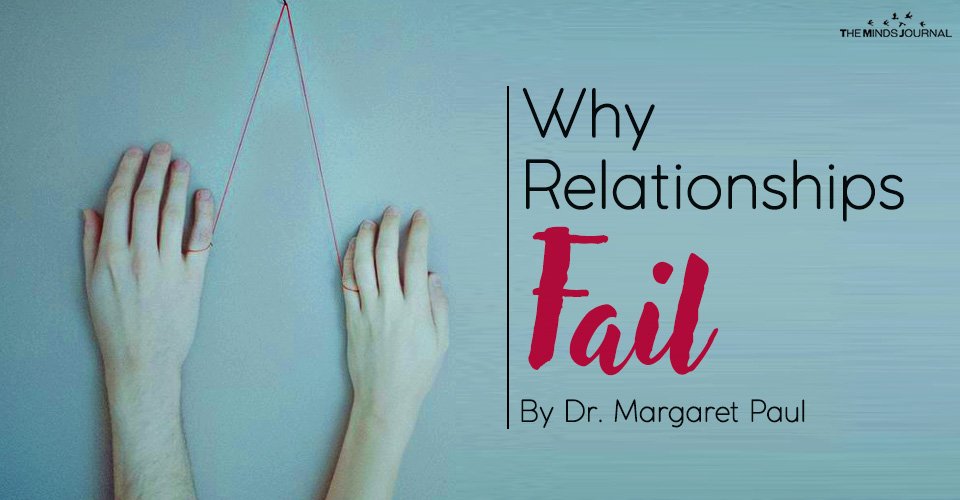Most people, when asked if they want a loving relationship, will say that having a loving relationship is one of the two most important things to them – along with having work they love.
Why, then, do so many relationships fail?
If we want to go deeply into why relationships fail, we need to go all the way back to the parental relationship.
When we didn’t receive the love, safety, security and emotional regulation we needed as infants, we developed protective patterns that allowed us to manage the pain of this – patterns that, unless healed, continue to affect our relationships. Protective patterns, such as anger, withdrawal, compliance, and resistance invariably create relationship problems.
The bottom-line issue is that when we didn’t receive the love we needed, we didn’t learn to love ourselves. Instead, we learned to abandon ourselves with our various protections against the pain of not being loved.
If there is one answer to why relationships fail, it’s because we don’t love ourselves. Instead, we try valiantly to get the love from our partner that we didn’t receive as a child or try to avoid being controlled by our partner the way we might have been controlled as a child. While we are operating from our protective patterns, our partner is doing the same thing. The love that we originally felt grinds to a halt as the patterns of anger, withdrawal, compliance and resistance play out.
In the 46 years that I’ve been working with individuals and couples, I’ve seen variations of this same pattern play out over and over, resulting in a failed relationship unless the protective patterns heal.
Healing Rather Than Leaving
Since we generally attract people at our common level of woundedness – which means our common level of self-abandonment/self-rejection/lack of self-love- the chances of repeating the patterns that lead to relationship failure are great. Unless there is physical or emotional abuse, relationship problems can offer us opportunities to heal these patterns. Yet, often, when things get tough, we think we need to leave the relationship.
Instead, why not stay, and take advantage of the opportunity? Why not devote yourself to learning to love yourself so that you can share the love with your partner?
Here is what can happen in a relationship when two people decide to learn to love themselves, which is what the Inner Bonding process is all about.
As you each learn to connect with your Source of Love (we live in a universe of love, but when you are operating from your protective patterns, you can’t feel the love that is here for you), you begin to be able to feel love within.
As you each learn to feel the love within, you gradually learn to define yourselves as this love. You each recognize that your soul is a part of this love, and therefore lovable and worthy. The more you each define your intrinsic worth as love, the fuller you each feel inside, and eventually, you both feel so full of love within that it comes spilling out to be shared with each other.
Loving yourselves brings each of you the safety and security you might have been seeking from each other. Now, instead of trying to get love from each other, you are each sharing your love with your partner. Ironically, you are each giving to the other what you have wanted from each other, but were unable to freely give to each other previously.
I hope you can see that self-abandonment/self-rejection is the major cause of relationship failure and learning to love yourself is what heals relationships. There is no greater joy in life than the sharing of love, but you cannot share what you don’t know you have. Until you learn to love yourself, you cannot share the love with another.
So, instead of leaving your relationship, learn to love yourself, and create the relationship you’ve always wanted. Even if just one of you decides to learn to love yourself, your relationship system might change enough to turn the relationship around. And it if doesn’t and the relationship comes to an end, at least you won’t be taking the same protective patterns into your next relationship. You have nothing to lose by learning to love yourself!
Written by Margaret Paul, PhD For information or to schedule a phone or Skype session: 310-459-1700 • 888-646-6372 (888-6INNERBOND) http://www.innerbonding.com
You may also like
Why Romance Turns Toxic: The Psychology Behind Love & Relationships
18 Relationship Red Flags You Should Never Ignore
A 23 Point Love Contract To Bulletproof Your Relationship
12 Habits In A Relationship That Are More Harmful Than Cheating
4 Signs That Indicate You Are In A Selfish Relationship
2 Stupid Words …You Should Never Use In A Relationship
When Someone You Love Becomes Toxic










Leave a Reply